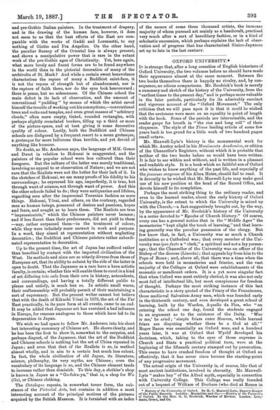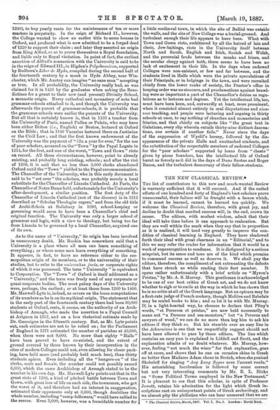OXFORD UNIVERSITY.* IT is strange that, after a long cessation
of English historians of Oxford University, the two volumes before us should have made their appearance almost at the same moment. Between the two books themselves there is happily no rivalry, and, by con- sequence, no odious comparisons. Mr. Brodriek's book is merely a summary and sketch of the history of the University, from the "earliest times to the present day," and is perhaps more valuable in the later periods, particularly for its admirably succinct and vigorous account of the "Oxford Movement." The only criticism that we will pass upon it is that it could be wished that the sentences were more on an equality in point of length with the book. Some of the periods are interminable, and the reader gasps for breath in "the rise and long roll" of their eloquence. The style of the Times leading article of some few years back is too grand for a little work of two hundred pages small octavo.
Mr. Maxwell-Lyte's history is the monumental work for which Mr. Anstey asked in his Munimenta Academica, or edition of the Chancellor's Registers, without which it is probable that neither of the two books before us would have been written. It is fair to see within and without, and is written in a pleasant and readable style. It is a book which no faithful son of Oxford who wishes to know anything of the past life, and especially of the jeunesse orogeuse of his Alma Mater, should fail to read. It is devoutly to be wished that Mr. Maxwell-Lyte may make good use of his new position at the head of the Record Office, and devote himself to its completion.
Perhaps the most striking thing to the ordinary reader, and even to the learned reader, about the early history of Oxford University, is the extent to which the University is mixed up with the Church,—a fact suggestively brought out, by the way, by the appearance of Mr. Brodrick's history of the University in a series devoted to "Epochs of Church History." Of course, every one has a general notion that in the "Middle Ages" the monasteries "kept alight the torch of learning," and that learn- ing generally was the peculiar possession of the clergy. But few know that, in fact, a University was as much a Church institution as a Cathedral was ; that every member of the Uni- versity was ipso facto a "clerk," a spiritual and not a lay person- age; that the Chancellor of the University was an officer of the Bishop of the diocese (Lincoln); that appeals lay from him to the Pope of Rome ; and, above all, that there was a time when the schools were held in monasteries and friaries, and the vast majority of the Colleges at Oxford were establishments of the monastic or mendicant orders. It is a yet more singular fact that when Oxford was most entirely clerical, it was also not only most full of intellectual life, bat most conspicuous for freedom of thought. Perhaps the most striking instance of this last characteristic is a story quoted of the Friary of the Franciscans, those medireval Salvation-Army men, which was founded early in the thirteenth century, and soon developed a great school of learning, built by the Warden, Aquello da Pisa, who "on entering the school one day, found the students engaged in an argument as to the existence of the Deity. 'Woe is me,' he cried ; 'simple friars enter Heaven, while learned friars are disputing whether there be a God at all.'" Roger Bacon was essentially an Oxford man, and a hundred yearn later, it was at Oxford that Wyclif developed his doctrines, which, taking to the eyes of those supreme in Church and State a practical political turn, were at the beginning of the fifteenth century stamped out by persecution. This seems to have crushed freedom of thought at Oxford so effectively, that it has never since become the starting-point of any progressive movement.
The actual origin of the University is, of course, like that of most ancient institutions, involved in obscurity. Mr. Maxwell- Lyte "makes hay" of the Alfred myth, especially in connection with University College. This College was really founded out of a bequest of William of Durham (who died at Rouen in • History of the University of Oxford. By H. O. Marwell-Lyte, Deynty-lieeper of the Public Records. London Macmillan and Co.—Magary of the Untoormily of Osford. By the Hon. G. 0. Braid* Warden of Merton. London: Long- man', Green, and Co. 1249), to bay yearly rents for the maintenance of tea or more masters in perpetuity. In the reign of Richard IL, however, the College wanted to show an earlier title to some houses in Oxford, and produced what is now admitted to be a forged deed of 1220 to support their claim ; and later they asserted an origin from King Alfred, so as to prove themselves a Royal foundation, and liable only to Royal visitation. In point of fact, the earliest assertion of Alfred's connection with the University is said to be in the reign of Edward IlL, in Higden'e Polychronicon, supported by Radborn'e Liter de Hyda, compiled during the second half of the fourteenth century by a monk in Hyde Abbey, near Win- chester, which Mr. Anstey can imagine "no sane man" accepting as true. In all probability, the University really had, as was claimed for it in 1426 by the graduates when asking the Bene- dictines for a grant to their new (and present) Divinity School, a monastic origin. Every cathedral and monastery of note had grammar-schools attached to it, and though the University was afterwards the parent of grammar-schools, it is probable that the grammar-schools were earlier the parents of the University. But all that is certainly known is, that in 1133 a teacher from the University of Paris, named Pullen or Polein, who may have been either Briton (i.e., English) or Breton, lectured at Oxford on the Bible ; that in 1149 Vacarius lectured there on Justinian or the Civil Law ; and that the first known endowment of the University was the payment of "b28. a year for ever," for the use of poor scholars, assessed on the "Town" by the Papal Legate in 1214, for the first, and one of the worst, "Town and Gown" riots on record. All these circumstances, however, point to already existing, and probably long existing, schools ; and after the riot of 1209, it is said that no less than 3,000 clerks abandoned Oxford until the " Town " yielded to the Papal excommunication. The Chancellor of the University, who in this early document is said to be "set over" the scholars, was probably merely a local substitute for the Chancellor of Lincoln Cathedral. At Paris, the Chancellor of Notre Dame held, unfortunately for the University's after-development, a similar position. The first duty of the Chancellor of Lincoln Cathedral (not of the diocese) is in 1212 described as " Scholas Theologim regere," and from the old title of Archi-Schola at Salisbury in 1096, school-keeping or governing would seem to have been a Chancellor's chief and original function. The University was only a larger school of grammar and logic, with a view to theology, but being too far from Lincoln to be governed by a local Chancellor, acquired one of its own.
As to the name of "University," its origin has been involved in unnecessary doubt. Mr. Ruskin has somewhere said that a University is a place where all men can learn something of everything ; or where some men learn everything of something. It appears, in fact, to have no reference either to the cos- mopolitan origin of its members, or to the universality of their studies, but to refer to the universitas Jura, or corporate rights of which it was possessed. The term " University " is equivalent to Corporation. The " Town " of Oxford is itself addressed as a " Uuivereity," and the term was freely used of any corporate or quasi-corporate bodies. The most palmy days of the University were, perhaps, the earliest ; or at least those from 1200 to 1400. Mr. Maxwell-Lyte is, indeed, as severe on the loose computations of its numbers as he is on its mythical origin. The statement that in the early part of the fourteenth century there had been 30,000 students at Oxford, rests, it seems, on the authority of an Arch- bishop of Armagh, who made the assertion to a Papal Council at Avignon in 1357, and on a less rhetorical estimate made by Dr. Gaecoigne in the fifteenth century. Bat, as Mr. Lyte points out, such estimates are not to be relied on ; for the Parliament of England in 1371 estimated the number of parishes at 40,000, when there were not 9,000. No more than eighty "Hails" have been proved to have co-existed, and the extent of ground covered by those known by their incorporation in the sites of modern Colleges could not, even allowing for closer pack- ing, have held more (and probably held much less), than thirty students apiece. Even including all the "hangers-on" of the clerks, male and female, the number could not possibly exceed 6,000, which the same Archbishop of Armagh stated to be the number in his own day. Mr. Maxwell-Lyte points out that in the great riots of 1298, a kind of pitched battle between Town and Gown, with great loss of life on each aide, the townsmen, who got the worst of it, and therefore had an interest in exaggeration, estimated their opponents only at 3,000, though doubtless the whole number, including "camp-follower," would have rallied to the rescue. Even 3,000, however, was a formidable number for
a little medireval town, in which the site of Balliol was outside the walls, and the site of New College was a burial-ground. And turbulent enough their life appears to have been. What with Town and Gown riots, embittered by all the hatred of laic and cleric, Jew-baitings, riots in the University itself between North and South, English and Irish, Scotch and Welsh, and the perennial feuds between the monks and friars, and the secular clergy against both, there seems to have been no lack of excitement in their life. In the days when endowed Colleges were non-existent, or few and far between, and the students lived in Halls which were the private speculations of their Principals, or in lodgings in the town, and were recruited chiefly from the lower ranks of society, the Proctor's office in keeping order was no sineoure, and proclamations against brawl- ing were as important a part of the Chancellor's duties as regu- lations as to lectures and degrees. Yet the intellectual life, too, must have been keen, and, outwardly at least, more prominent, when it consisted almost entirely in oral disputations and viva
- race teaching, and people were lecturing and arguing in thirty schools at once, to say nothing of churches and monasteries and friaries, and that chiefly on subjects like "the great text in Galatians, every slip wherein entails thirty-nine distiuct damns,- tions, one certain if another fails." Never since the days of the suppression of Wyclira heresy, followed by the dis- appearance of the private Halls and unattached students, and the substitution of the respectable members of endowed Colleges for the "poor scholars" supported by loans from " chests " given by pious founders, has the intellectual life of Oxford burnt as fiercely as it did in the days of Dons Scotus and Roger Bacon, and the turbulent democracy of their fellow-students.



































 Previous page
Previous page